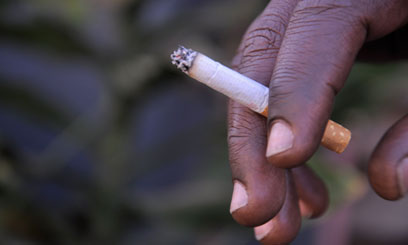
BAT East and Central Africa Area Director Gary Fagan said they were extremely disappointed by the decision which he termed as a “bad piece of law”/FILE
NAIROBI, Kenya, Aug 15 – British American Tobacco (BAT) East Africa has expressed disappointment with a court ruling in Australia upholding a rule for tobacco products to be sold in drab, uniform packaging with graphic health warnings.
Four companies led by the global cigarette giant BAT had challenged the law and argued that it was unconstitutional because the law infringed their intellectual property rights by banning brands and trademarks from packets.
BAT East and Central Africa Area Director Gary Fagan said they were extremely disappointed by the decision which he termed as a “bad piece of law”.
Fagan noted that the court decision only concerns Australian constitutional law and in Kenya, the Tobacco Control Act 2007 is currently in force and they have a robust legislative framework on intellectual property.
He added that the decision is separate from the various other investment and trade-related disputes which Australia is currently facing as a result of introducing the Tobacco Plain Packaging Act.
These include Australia’s World Trade Organisation dispute with Honduras, Dominican Republic and Ukraine, and the claim Australia is facing for breaching its Bilateral Investment Treaty with Hong Kong.
“We fully support any form of evidence-based regulation but there is no proof to suggest plain packaging of tobacco products will be effective in discouraging youth initiation or encouraging cessation by existing smokers,” he said.
“In fact, plain packaging would only exacerbate an already significant illicit tobacco trafficking problem, and would have other significant adverse unintended consequences including driving down prices which would lead to increased smoking while reducing government tax revenue,” he explained.
The law mandates that as of December 1, cigarettes must be sold in drab olive-green packs and ban all commercial logos. Packs will be distinguishable only by printed brand names in a standard font and size.
The court rejected the argument by BAT, Japan Tobacco International, Imperial Tobacco and Philip Morris that the law represented “an acquisition of (their) property otherwise than on just terms”.
In a statement this morning the court said: “At least a majority of the Court is of the opinion that the (Tobacco Plain Packaging) Act is not contrary to s 51(xxxi) (of the Constitution).”
The court’s full reasons will be delivered at a later date, and the tobacco firms were ordered to pay the government’s legal costs.
They cannot appeal further in the Australian legal system.
The Australian High Court case centred on three key legal arguments: first, that items including trademarks, copyright, designs, patents, goodwill, physical products and packaging constitute property; secondly, that plain packaging legislation would see British American Tobacco stripped of any right to this property and thirdly that a related benefit had been passed on to the Australian Government as a result.
BAT said it would respect the “bad law”, but warned it would cause black-market cigarette sales to skyrocket as the packaging would be easy to fake and so “only benefit organised crime groups”.
Philip Morris noted that a number of other legal challenges had been launched, including a case in Hong Kong alleging the law breached Australia’s bilateral investment treaty with the Chinese territory.
“The legality of plain packaging, including whether Australia will have to pay substantial compensation to Philip Morris Asia, remains at issue and will be considered in other ongoing legal challenges,” said spokesman Chris Argent.
The World Health Organization (WHO) also welcomed the decision and hoped it would have a “domino effect” in other countries.
“The industry’s attempt to derail this effective tobacco control measure failed,” said the United Nation health agency’s director general Margaret Chan.
Chan pointed out that other countries had been watching the outcome of the hearing and were considering similar measures.
“With so many countries lined up to ride on Australia’s coattails, what we hope to see is a domino effect for the good of public health,” she said.
“Plain packaging is a highly effective way to counter industry’s ruthless marketing tactics,” she added.
Framework Convention Alliance Director Laurent Huber also welcomed the decision and said that it was an important victory for global tobacco control.
“It upholds the right of national governments to protect the health of their citizens, and it will also encourage governments that have been reluctant to implement the measures in the WHO Framework Convention on Tobacco Control (FCTC) because of threats from the tobacco industry,” she said.
Plain packaging is included in the FCTC, the world’s first public health treaty.
Guidelines to Article 11 on packaging and labelling of tobacco products state: ‘Parties should consider adopting measures to restrict or prohibit the use of logos, colours, brand images or promotional information on packaging other than brand names and product names displayed in a standard colour and font style (plain packaging).’





















